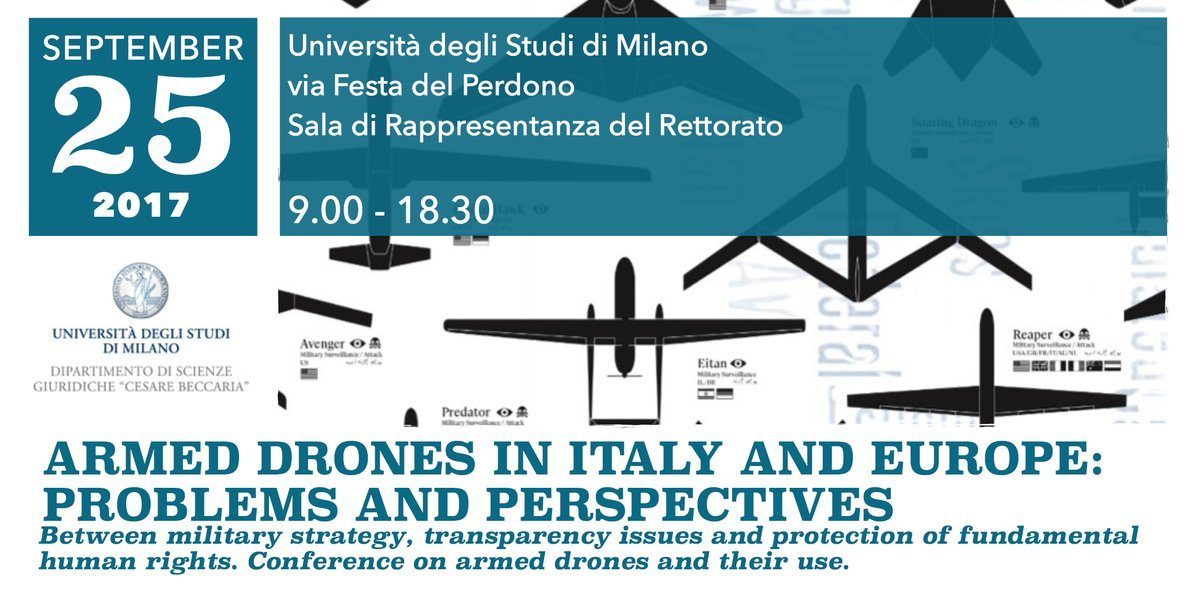Report: Conference on Armed Drones in Italy and Europe

On the 25th of September, Rete Italiana per il Disarmo, CILD and the ECCHR hosted a conference in Milan on ‘Armed drones in Italy and Europe: Problems and Perspectives Between military strategy, transparency issues and protection of fundamental human rights’. The conference brought together many academics, legal experts, and civil society groups from Europe and the United States to discuss their concerns over the increasing use of drone technology for military purposes.
Though initially employed for intelligence, surveillance and recognition (ISR) operations, drones are increasingly armed and deployed in operations targeting alleged terrorists outside the area of armed conflict. This issue has become paramount as Europe, like the US and Israel, has become one of the leading actors in development, acquisition and use of all kinds of military drones and related technologies.
Starting with a panel on the international legal framework, experts discussed legal issues posed by the use of armed UAVs. Jessica Dorsey (ICCT Associate Fellow, and Senior Legal and Policy Officer at Rights Watch UK) presented her extensive policy paper written for the European Parliament’s Human Rights Subcommittee, which emphasized the need for a common EU position on the use of armed drones. Dorsey stressed the importance of ensuring compliance with international human rights and humanitarian law to stop, what Srdjan Cvijic (senior policy analyst at Open Society Foundation) called, a ‘borderless war’ – referring to the continuous military operations in various conflict areas.
From an academic standpoint, Alex Moorehead (Director, Project on Counter Terrorism, Armed Conflict and Human Rights) spoke about the need for transparency as a prerequisite for the rule of law. At the present, the full extent of participation of European countries in the US drone program and deployment of European drones remains hidden from the public. As a result, the ministries of defense are not held accountable to legally justify their potential complicity in targeted killing programs.
Waleed Alhariri (heads the New York office of the Sana’a Center for Strategic Studies) offered a unique, Yemeni perspective on the use of armed drones in counterterrorism, highlighting the often ignored psychological and economic toll of drones strikes. Alhariri spoke in detail on how a lack of transparency and a denial of civilian casualties impact families in local communities. His account underlined former Air Force technician and whistleblower Cian Westmoreland critique of the false claims made by dominant narratives on the accuracy of drones. In practice, the inaccurate cell phone data used to guide drone strikes poses a permanent threat for civilians. Cian, therefore, urged European countries to critically examine their assistance and complicity in illegal US drones strikes.
The conference also included a specific panel on ‘the legal consequences of drones in Italy’, discussing the Italian responsibilities with regard to the US drone operations launched from Sigonella airbase and the related civilian casualties. The presence of Massimo Artini (Vice President of the Defense Committee in the Italian House of Representatives) and Silvano Frigerio (Commander of the Combat Force of the Italian Air Force) could have resulted in a valuable contribution toward the development of an adequate Italian policy on the use of armed drones. However, neither Mr. Artini nor Commander Frigerio wished to elaborate on the issue, despite the acquisition and arming of MQ-9 Reapers by the Italian army being a ‘public secret’.
It was concluded that a unified European voice on the use of armed drones is still absence. It is therefore essential that members of the European Forum on Armed Drones continue their collective efforts to raise awareness and pressure European states to work toward an unified position on the use and export of armed drones.
Author: Alies Jansen (Humanitarian Disarmament intern at PAX)

